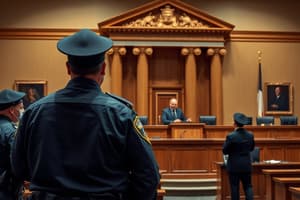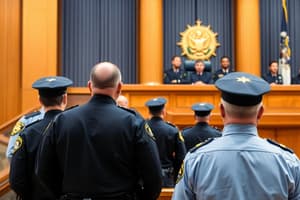Podcast
Questions and Answers
What landmark case established that suspects must be informed of their constitutional rights before custodial interrogation?
What landmark case established that suspects must be informed of their constitutional rights before custodial interrogation?
- Roe v. Wade
- Estelle v. Gamble
- Arizona v. Miranda (correct)
- Gideon v. Wainwright
What does actus reus refer to in criminal law?
What does actus reus refer to in criminal law?
- The guilty mind or intent
- The crime's motivation
- The act of punishment
- The guilty act or conduct (correct)
Which system of prison reform emphasized solitary confinement for penitence?
Which system of prison reform emphasized solitary confinement for penitence?
- The Auburn system
- The California system
- The New York system
- The Pennsylvania system (correct)
What type of deterrence aims to prevent crime by discouraging potential offenders through examples?
What type of deterrence aims to prevent crime by discouraging potential offenders through examples?
What does mens rea refer to in the context of proving a crime?
What does mens rea refer to in the context of proving a crime?
What case established that deliberate indifference to an inmate's serious medical needs violates the Eighth Amendment?
What case established that deliberate indifference to an inmate's serious medical needs violates the Eighth Amendment?
The Auburn system is also known by what name?
The Auburn system is also known by what name?
Judicial review primarily ensures that laws and procedures adhere to what?
Judicial review primarily ensures that laws and procedures adhere to what?
What is the primary goal of deterrence as a theory of punishment?
What is the primary goal of deterrence as a theory of punishment?
What does the term 'Actus Reus' refer to in criminal law?
What does the term 'Actus Reus' refer to in criminal law?
Which role does the Supreme Court play in the criminal justice system?
Which role does the Supreme Court play in the criminal justice system?
What is the ethical dilemma often faced by law enforcement officers?
What is the ethical dilemma often faced by law enforcement officers?
Which best describes the concept of restorative justice?
Which best describes the concept of restorative justice?
What do 'concurrent sentences' indicate in criminal sentencing?
What do 'concurrent sentences' indicate in criminal sentencing?
What are the challenges faced in balancing individual rights with public safety?
What are the challenges faced in balancing individual rights with public safety?
Which factor is NOT typically considered a socioeconomic influence on crime?
Which factor is NOT typically considered a socioeconomic influence on crime?
What are the three traditional components of the criminal justice system?
What are the three traditional components of the criminal justice system?
What is dual federalism in relation to the criminal justice system?
What is dual federalism in relation to the criminal justice system?
How do misdemeanors differ from felonies?
How do misdemeanors differ from felonies?
What role do the police serve in the criminal justice system?
What role do the police serve in the criminal justice system?
What is the significance of the Miranda v. Arizona (1966) case?
What is the significance of the Miranda v. Arizona (1966) case?
What distinguishes general deterrence from specific deterrence?
What distinguishes general deterrence from specific deterrence?
What do the terms actus reus and mens rea refer to in criminal law?
What do the terms actus reus and mens rea refer to in criminal law?
Which prison system emphasizes silent work and congregate labor?
Which prison system emphasizes silent work and congregate labor?
What is the primary function of a Grand Jury?
What is the primary function of a Grand Jury?
Which of the following best defines Mens Rea?
Which of the following best defines Mens Rea?
What does the term 'Double Jeopardy' refer to in criminal law?
What does the term 'Double Jeopardy' refer to in criminal law?
Which punishment theory focuses on preventing future crimes by incapacitating offenders?
Which punishment theory focuses on preventing future crimes by incapacitating offenders?
What is a Misdemeanor typically punishable by?
What is a Misdemeanor typically punishable by?
What does the Insanity Defense claim?
What does the Insanity Defense claim?
What is the role of Judicial Review?
What is the role of Judicial Review?
What does Dual Federalism imply about the government's structure?
What does Dual Federalism imply about the government's structure?
What is the primary focus of the Pennsylvania System of prison management?
What is the primary focus of the Pennsylvania System of prison management?
Which of the following best describes a plea bargain?
Which of the following best describes a plea bargain?
What does probable cause refer to?
What does probable cause refer to?
What is the role of a prosecutor in a criminal case?
What is the role of a prosecutor in a criminal case?
What is the primary goal of rehabilitation in criminal justice?
What is the primary goal of rehabilitation in criminal justice?
Which principle ensures that past judicial decisions guide future cases?
Which principle ensures that past judicial decisions guide future cases?
What does revocation refer to in the context of probation?
What does revocation refer to in the context of probation?
What is a status offense?
What is a status offense?
Flashcards are hidden until you start studying
Study Notes
Criminal Justice System Components
- Law enforcement investigates crimes, apprehends suspects, and maintains order.
- Courts adjudicate criminal cases, determine guilt or innocence, and impose sentences.
- Corrections supervise and incarcerate convicted offenders, aiming to rehabilitate and reintegrate them into society.
Dual Federalism
- The federal and state governments share power in the criminal justice system.
- Both levels have independent laws, law enforcement agencies, and court systems, leading to potential overlaps.
- Dual federalism creates complexities in how laws are applied and enforced.
Misdemeanors vs. Felonies
- Misdemeanors are less serious crimes with lesser punishments, usually fines or jail time under a year, e.g., petty theft, vandalism, public intoxication.
- Felonies are more serious crimes with longer terms of imprisonment (over a year), e.g., murder, robbery, arson.
Police as Gatekeepers
- Police officers initiate the formal criminal justice process by deciding whether to ignore, warn, cite, or arrest individuals.
- This decision significantly influences the flow of cases within the system.
Miranda v. Arizona (1966)
- The Supreme Court ruled that suspects must be informed of their constitutional rights (the right to remain silent and the right to counsel) before custodial interrogation.
- This landmark decision impacted police procedures and protected suspects' rights.
Deterrence Strategies
- General deterrence aims to prevent crime by using punishment as an example, discouraging potential offenders.
- Specific deterrence targets individuals already punished, deterring future criminal behavior in them.
Judicial Review
- The courts' power to declare laws unconstitutional is called judicial review.
- It ensures that laws and procedures comply with constitutional rights, safeguarding individual liberties.
Actus Reus and Mens Rea
- Actus reus refers to the physical act or conduct constituting a crime.
- Mens rea refers to the guilty mind or intent required for a crime.
- Proving both elements establishes criminal liability by demonstrating the individual committed the act with the required mental state.
Prison Systems: Pennsylvania vs. Auburn
- The Pennsylvania system focused on solitary confinement for penitence, with inmates working and reflecting alone.
- The Auburn system used congregate labor during the day, where inmates worked silently together but were isolated at night.
Prisoner's Rights: Estelle v. Gamble (1976)
- Prisoners retain certain constitutional rights, though some may be limited due to security concerns.
- Estelle v. Gamble ruled that deliberate indifference to an inmate's serious medical needs violates the Eighth Amendment, ensuring basic medical care for prisoners.
Studying That Suits You
Use AI to generate personalized quizzes and flashcards to suit your learning preferences.




